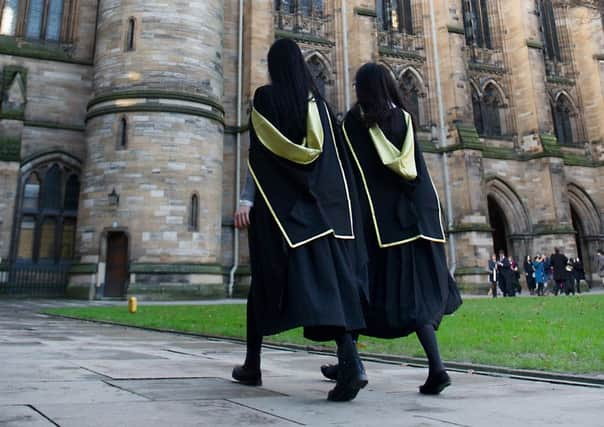Poorer students '˜to get into university with lower grades'


The plan is part of a national drive to tackle concerns of elitism among the country’s top academic institutions. A new flagship target has been established of ensuring youngsters from deprived backgrounds make up a fifth of the student population by 2030.
But the move to lower entry thresholds has prompted concerns from universities and opposition parties.
Advertisement
Hide AdAdvertisement
Hide AdThe recommendation is contained in a report entitled a Blueprint for Fairness, published yesterday by the Commission on Widening Access, which was established by ministers.
Education secretary Angela Constance welcomed the findings and said the country has more to do in ensuring youngsters from working-class backgrounds get a fair chance of making it to university.
She said: “Scotland has a social, moral and economic duty to achieve fair access.”
Some universities, including Glasgow and St Andrews, already allow youngsters from poorer backgrounds on to certain courses with lower grades. Experts say this redresses an imbalance as youngsters from wealthier backgrounds do not face the same “educational, cultural and systemic barriers”.
The report said: “By 2019 all universities should set access thresholds for all degree programmes against which learners from the most deprived backgrounds should be assessed. These access thresholds should be separate to standard entrance requirements and set as ambitiously as possible, at a level which accurately reflects the minimum academic standard and subject knowledge necessary to successfully complete a degree programme.”
Among the other recommendations are that by 2030, students from the 20 per cent most deprived areas make up 20 per cent of those entering university; that youngsters from the care system applying should also be guaranteed a place in university if they meet admissions thresholds, and that there should be a more collaborative approach to delivering access programmes.
Ms Constance said the situation for poorer students has improved since 2007.
“We know that there remains much more to do,” she added. “The Scottish Government will immediately accept the Commission’s recommended targets. Achieving these will not be the sole responsibility of universities, nor indeed just the education system – we will all have to work collectively.”
Advertisement
Hide AdAdvertisement
Hide AdShe added: “This government is determined to make urgent progress on achieving our ambition of equal access.”
Universities Scotland Convener, Professor Sir Pete Downes, the principal and vice-chancellor of the University of Dundee, said: “Some recommendations, including those that focus on minimum entry requirements and guaranteed places, are going to be challenging for universities and for the Scottish Government, but we will not shy away from that.”
The issue will be discussed at a meeting of university principals next month.
Labour education spokesman Iain Gray said the SNP had cut spending on education and training by 10 per cent since coming to office in 2007.
But he added: “These are welcome initiatives as anything that helps to close the gap between the richest and the rest in our education system should be encouraged.”
Scottish Conservative education spokeswoman Liz Smith voiced concern over the proposed entry changes, saying: “This is bound to lead to difficulties for universities and it will put added pressure on higher education funding, since more places will have to be made available if no student is to be squeezed out.”